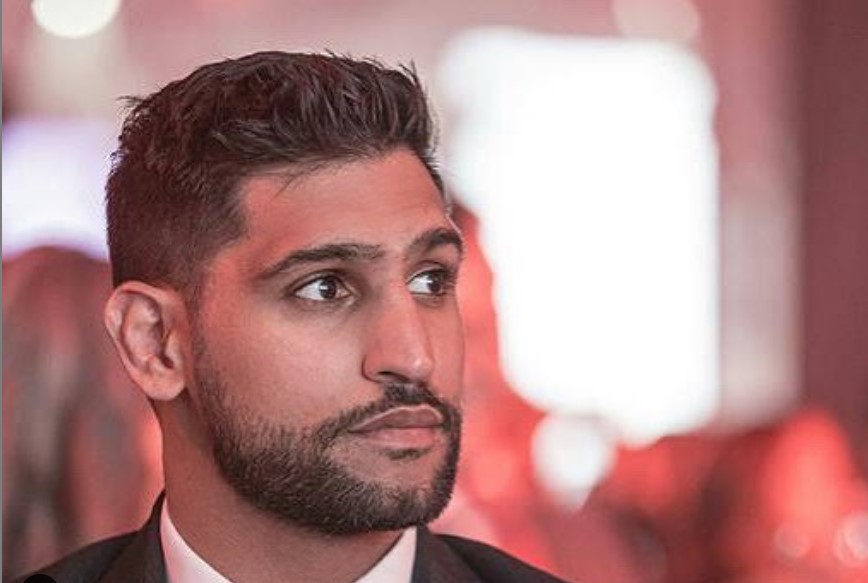
By: KeerthiMohan
by NADEEM BADSHAH
BOXING icon Amir Khan has been praised for inspiring people from ethnic minority backgrounds to lace up their gloves and take up the sport.
The former world champion will be among those featured in a new book on fighters from immigrant families of BAME heritage.
Dr David Dee, from De Montfort University in Leicester, has been awarded a research grant to spend the next two years researching brawlers from the mid-18th century through to the present day.
Khan rose to fame after winning a silver medal at the 2004 Athens Olympics and winning a world title aged 22 in 2009. The 32-year-old from Bolton, Lancashire, has also spoken out against terrorism and highlighted poverty in Pakistan and Africa.
Rajinder Dudrah, professor of cultural studies and creative industries at Birmingham City University, told Eastern Eye: “Amir Khan has gone across Asians, working class with true grit by using your hands, carving out your space.
“Sport and Asians do not have a colourful history, there is a lack of representation. You were veered away from sport, it wasn’t seen as a viable career, there were a lot of issues with racism.
“Amir Khan has shown with a work ethic it is possible. He has shifted the debate on race and identity; you can be Asian and fly the flag for Britain.
“It is a landmark statement and shown that we have come a long way.”
Khan’s colourful career has included wins over Zab Judah and Marcos Maidana, and losses to Canelo Alvarez and Terence Crawford in lucrative bouts.
His wife Faryal Makhdoom announced in August they are expecting their third child. The couple did a boxing-themed gender announcement on social media with Khan punching a balloon to reveal they are expecting a boy.
Dudrah added: “Him and his wife have become ‘Marmite figures’ but have made a media career. He can switch to TV presenting, brand endorsement, social media; it is seen as a lucrative career.
“Boxing is one sport that spoke to a lot of British Asians, using their body when skills or
qualifications were denied to them.”
Other British Asians in the sport include unbeaten featherweight Qais Ashfaq, heavyweight
Kash Ali, super welterweight Tony Bange and bantamweight Prince Patel.
Arun Kang, CEO of the Sporting Equals charity, said the number of role models in boxing has been vital for working class Asian communities.
He told Eastern Eye: “A good example of an inspiring role model are the British Asian boxers such as Amir Khan who has had a successful amateur and professional career in boxing, winning an Olympic medal and world title.
“This has helped boxing to resonate with many working class British Asian communities, thus substantially increasing the amount of British Asian boxers.
“Role models help to build empathy through the similar cultural challenges and pathway barriers they have faced, and therefore building belief in others that they can also tackle these issues and achieve their full potential.”
Kang said a lot of British Asian females have also been inspired to step into the ring in the amateur ranks and are becoming role models.
“Female boxers have been helped through innovative grassroots projects taking place by delivering sport through faith centres, such as those created by Sporting Equals and England Boxing, which has helped open sport to a wider audience,” he said.
“We now also have many female boxing role models such as Ambreen Sadiq, Saira Tabasum, Ramla Ali, Sannah Hussain and Simran Kaur.”
Dr Dee will be using personal papers gifted to archives by boxers who fought during the 20th century as well as newspapers, publicity materials and records from inner city youth groups which gave opportunities to budding fighters. He will also be using the archives of the British Amateur Boxing Association.
He said the link between immigration, ethnicity and sport was only beginning to get the attention it deserves.
The historian said: “In comparison to the amount we know and is written about sport and immigration in the United States, there is a lot of work to do to help us understand the links between sport and minority history and identity in Britain.
“When people think about immigration and minority lives, identities and communities, they don’t think enough about sport, and really, that’s a crucial part of who you are.
“It’s important for ideas of integration and responding to racism.”
